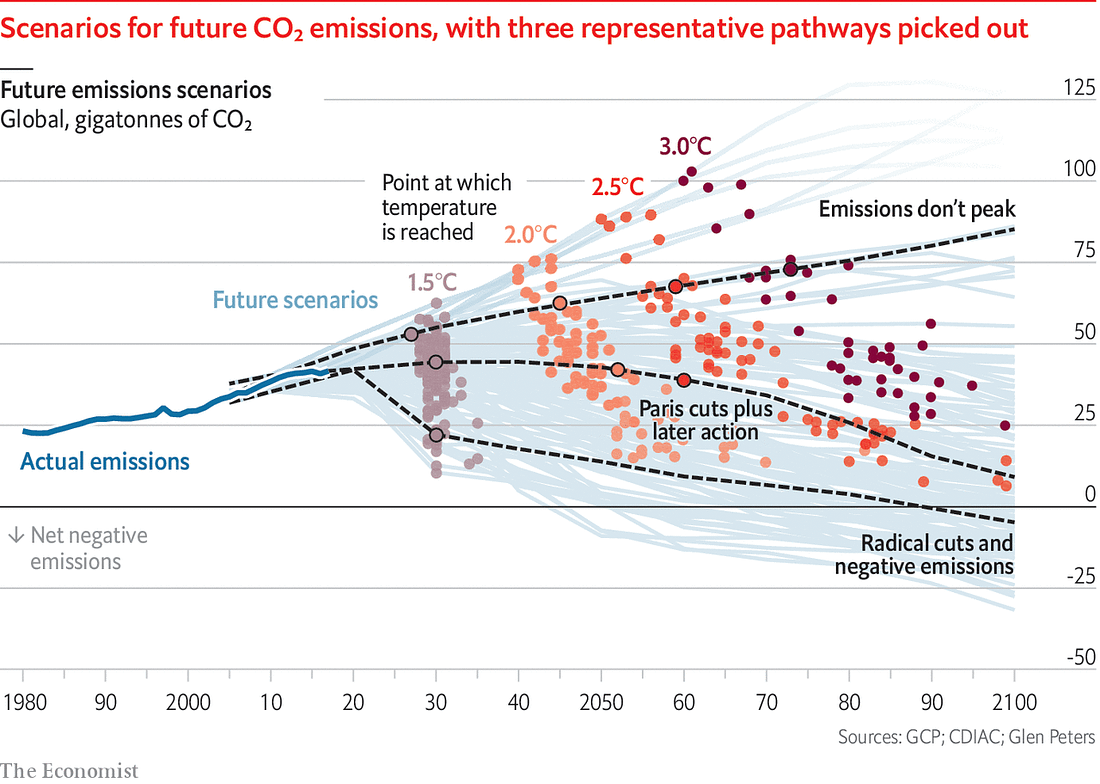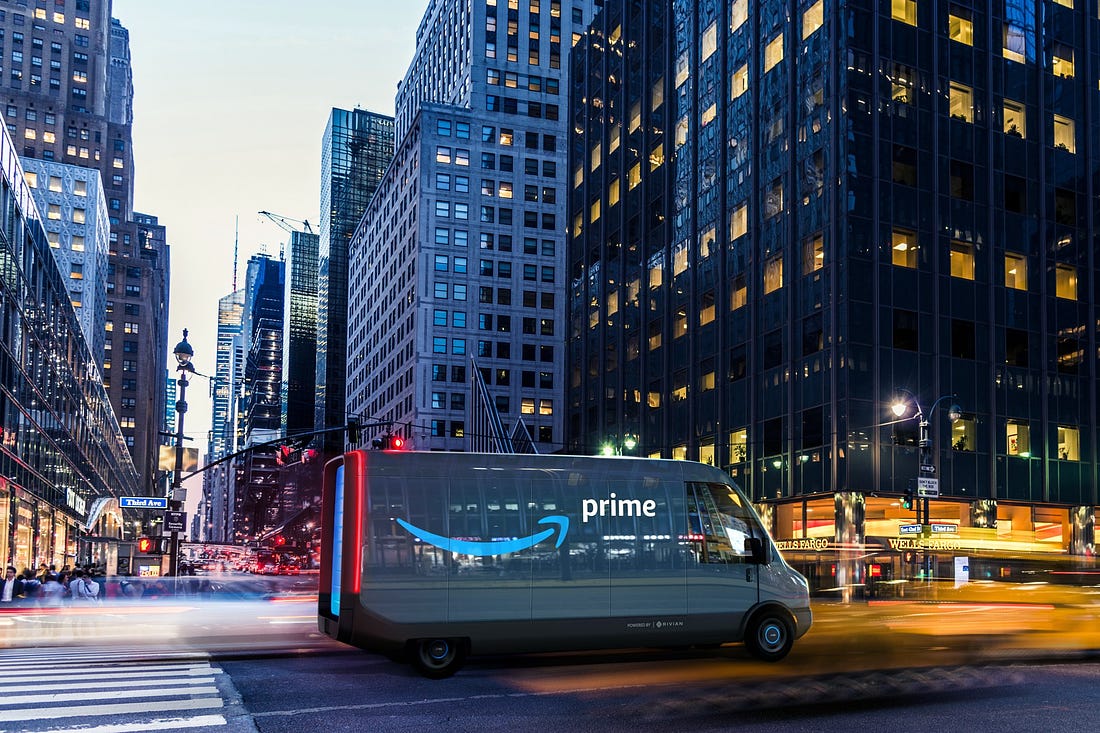Climate Change and Renewables
Climate Change was in focus this week as millions of people protesting around the world on a coordinated day of action. An estimated 300,000 people joined rallies in Australia.
The Economist wrote a Global Warming 101 piece that laid out the past, present, and future of climate change. The table below shows the expected temperature changes at different emission levels.
A new study published in Science said that climate change is already damaging the planet more than scientists had projected, endangering everything from food supply to the existence of island nations.
The Science paper underscores the urgency. It exhorts the international community to limit global warming to 1.5 degrees Celsius over preindustrial levels by 2100 and warns about widespread harm if the global mean surface temperature rises by 2 degrees in that period.
…
The paper’s lead author, Ove Hoegh-Guldberg, who is director of the Global Change Institute at the University of Queensland in Australia, also was the lead author of the special IPCC report (Climatewire, Oct. 15, 2018).
“We’re trying to change the message we’re projecting from ‘This is going to happen’ to ‘This is already happening, and to prevent this from getting worse, action needs to be ramped up,’” Warren said. “Scientists are very, very concerned. The picture for humans and ecosystems is really pretty grim if we don’t achieve this.”
Amazon ordered 100,000 electric delivery vans from a startup called Rivian. It aims to deliver the first Amazon van by 2021 and to deliver 10,000 by late 2022. The full fleet should be deployed globally by 2030. The scale of the order is unprecedented as there are currently only 70,000 to 100,000 electric commercial trucks on the roads. To put it into perspective, Fedex currently uses 85,000 “motorised vehicles” to deliver packages around the world, while UPS uses 123,000, indicating Amazon will likely do more last mile delivery themselves over time.
Daimler said last week that it’s stopping development of new internal combustion engines to focus on electric vehicles.
General Motors is also shifting to electric vehicles, which is contributing to a strike last week (electric vehicles take fewer people to make as they’re far simpler – this is also why maintenance costs are low).
BusinessWeek outlined the big bet GM CEO Mary Barra is making on an electric, self-driving future.
Barra, a GM lifer who’s been through plenty of similar moments as both boss and underling, told her audience the company is undergoing a wrenching but necessary transition. GM, she said, could no longer invest in slow-selling sedans and small cars or in far-flung markets that weren’t delivering significant profits. That money had to be plowed into electric vehicles and self-driving cars, which she described as the foundation of the company’s future. “We need to seize this opportunity,” she told the silent crowd. “Make no mistake, we are not here just to compete in this new world … we are here to win.”
CNBC put together a video on Why Volkswagen Is Betting On Electric Vehicles (12 minutes).
Solar and wind subsidies are declining, but that’s because they’re no longer needed – the industry has reached sufficient scale that the win and solar can now compete on their own against coal and nature gas plants in many markets.
CNBC also has a video on The Rise of Solar Power (15 minutes).
A company called Hypergiant Industries has created a “personal carbon sequestration” device that uses algae to remove CO2 from the air.
Finance
WeWork had another rough week. After delaying its IPO, price expectations dropped from $47 billion to $15 billion to $20 billion. The WSJ wrote a scathing profile of its CEO and co-founder Adam Neumann that raised real questions about how the company has been run, and by the end of the week some WeWork Board Members were looking to remove him as CEO. A separate WSJ piece talks about how Adam Neumann is right about the need to reinvent work.
I find WeWork interesting. It’s near-universally hated for good reason, but I think there’s a possibility it’s not just a “buy wholesale, sell retail” company like many people think it is. The core economics of a single WeWork centre stem from being able to fit more people into a space while keeping them happy, which means in theory they can simultaneously generate more revenue per sqm while offering employers a lower cost per employee. This could explain why large companies are now 40% of the business and possibly why companies like HSBC, IBM, and Facebook have used them in the past. If they’re going to salvage their IPO they need to do a better job of fleshing out these unit economics and how they differ from companies like IWG.
Datadog rose 39% in a strong IPO debut. The company offers infrastructure and application monitoring as a cloud-delivered service, and is the fourth cloud software company to IPO with a valuation greater than $10 billion this year. CNBC argues that what sets them apart (the others being Zoom, Slack, and Crowdstrike) is their very high retention rates.
Airbnb plans to go public next year – the New York Times takes a look inside.
Payment company Stripe has raised $250 million at a valuation of $35 billion.
Intercontinental Exchange is launching bitcoin futures.
Quantum Supremacy
Google has reportedly attained “quantum supremacy”, which means they’ve used a quantum computer to solve a task that is impossible for a normal computer to solve. The Google paper claims that their processor performed the calculation in 3 minutes 20 seconds whereas the most advanced classical computer today, the IBM Summit, would have taken approximately 10,000 years to solve it. Is this significant? Apparently so – Will Oliver, an MIT professor and quantum specialist, likened the computing milestone to the first flight of the Wright brothers at Kitty Hawk in aviation, but it’s not clear what task Google actually solved and how narrow in scope it was so it’s hard to understand the implications until more details are made available.
Other Snippets
The Streaming Wars: Comcast announced their streaming service will launch in April and will be called “Peacock”, a reference to NBCUniversal’s logo. It will start with 15,000 hours of content headlined by The Office (US version) and Parks and Recreation. Netflix picked up Seinfeld during the week, while WarnerMedia’s HBO Max picked up The Big Bang Theory. If there’s one winner from the streaming wars it’s Hollywood talent with leading producers now signing seven-figure deals.
Bob Iger has written a book about his 15 years as CEO of Disney. In a Vanity Fair exerpt he recalls his relationship with Steve Jobs and speculates that Disney and Apple would have merged by now if he was still around — worth a read.
Bloomberg explores hacking for a living with Tommy DeVoss in The Million-Dollar Hacker (10 minutes).
At the Defcon hacking conference next year, the Air Force will let hackers try to hijack an orbiting satellite.
The WSJ discovered that Free and Fair Markets Initiative, a nonprofit set up 18 months with the sole purpose of criticising Amazon, was secretly funded by some of Amazon’s biggest rivals: Oracle, Walmart, and Simon Property Group. The nonprofit previously claimed to have gross-roots support from average citizens across the US.
Synthetic biology startup Ginkgo Bioworks has raised an additional $290 million and is now worth $4 billion.
Vanguard Group is launching a robo-advisory service that cuts out human financial advisers completely.
Australian scientists are part of worldwide effort to boost agricultural output to meet growing global food demand by making crops more efficient at conducting photosynthesis.
Impossible Foods has entered grocery stores with their plant-based burgers.
AI is improving predictions of earthquakes and El Niño.
WIRED explores AI’s reproducibility problem.
PlayVS raised $50 million more for a high school esports platform. Australian startup XY Gaming raised $2.5 million for its global esports tournament platform.
Have a great week.
















